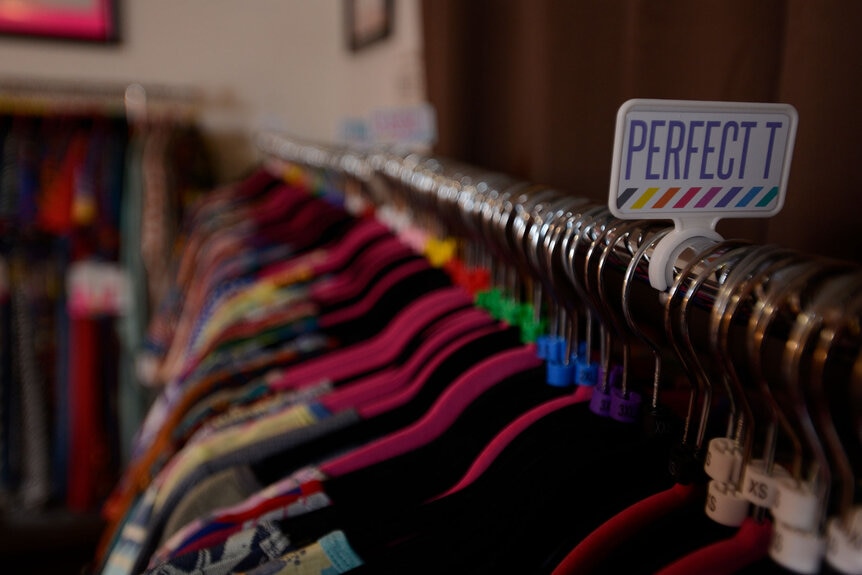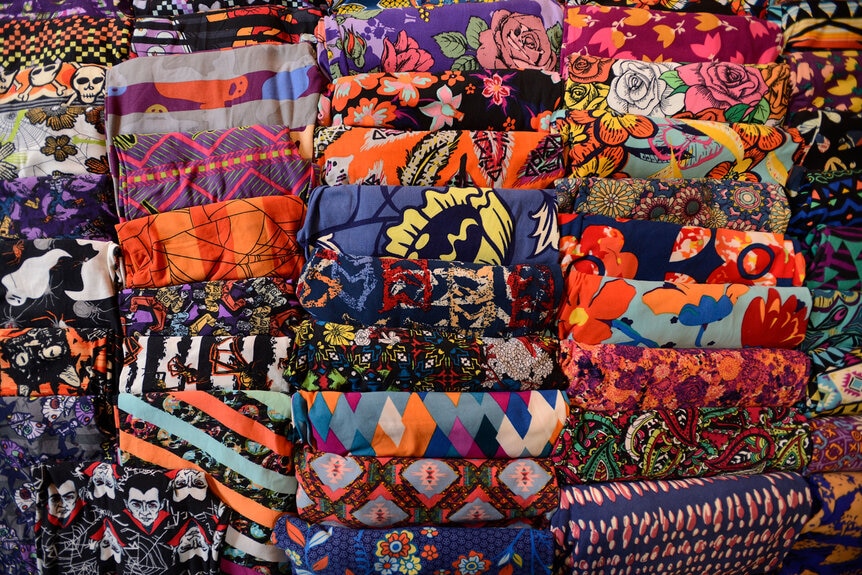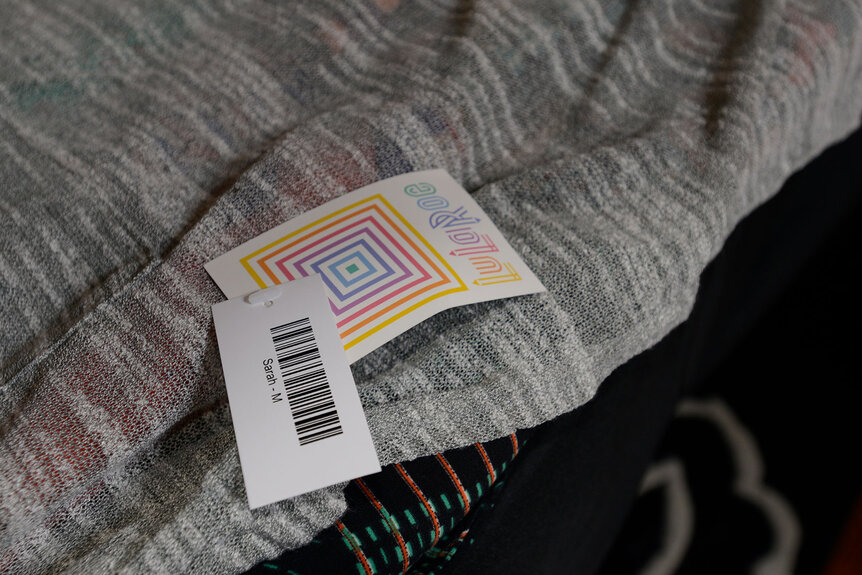Create a free profile to get unlimited access to exclusive videos, breaking news, sweepstakes, and more!
How LuLaRoe Made Its Founders Rich While So Many Others Went Bankrupt
A new docuseries from the makers of "Fyre Fraud" explores how LuLaRoe, a company marketed as a way for women to make money from home with their friends, is now known less for their leggings than for their debts.

A new Amazon documentary from the makers of "Fyre Fraud" looks at the once-ubiquitous multilevel marketing company LuLaRoe and how its dream of stay-at-home "mom-preneurs" fell apart amid a flood of ugly accusations (and uglier leggings).
Jenner Furst and Julia Willoughby Nason's documentary, "LuLaRich," will premiere on Amazon Prime on Sept. 10, and features interviews with former consultants, video footage from LuLaRoe trainings and events and a sit-down with LuLaRoe co-founders DeAnne and Mark Stidham.
LuLaRoe's pitch, initially, was this: for a buy-in of $5,000, would-be sellers could receive a "starter" kit of around 250-300 LuLaRoe fashion pieces in various sizes and styles. Known initially for their colorful leggings, at the height of their popularity in 2016, the company made 33 varieties of women's dresses, shirts, skirts and leggings, according to Forbes, and created about 400 new fabric designs a day, according to Business Insider.
According to court documents, sellers, known as consultants, had no control over what sizes, styles or even patterns they would get in any given order. They would set up a virtual shop (usually on Facebook and/or Instagram) and sell their pieces, increasing their inventory to sell more. As they signed up other consultants and those new people purchased inventory, they would earn bonuses — often in excess of what they made on their sales.
In April 2015, LuLaRoe had 2,000 consultants, according to Business Insider, and by September 2016, they had 35,000. In February 2017, they had more than 77,000, according to BI. In 2016, they were heralded as a new success story of the gig economy and social media age; Bloomberg reported they had $4 billion in revenue in 2017.
But in February 2021, they paid Washington state $4.75 million to settle allegations that they operated as a pyramid scheme, according to the Associated Press. In a consent decree filed in the case, the company denied all wrongdoing.
So, what happened?
DeAnne Brady Stidham (who married Mark in 1998 after her divorce) had a long history in direct sales — at least in her own telling. According to BuzzFeed News, she often tells LuLaRoe sellers that, in the 1990s, she met a man at swap meets who bought previous season's clothes in the wholesale market for resale. She started buying dresses from (and then through) him to sell at in-home trunk sales, focusing on other stay-at-home mothers in Mormon areas in the West.
In June 2012, DeAnne and her twin sister, Dianne, used Instagram to soft launch a maxiskirt business called "Fitted," with long skirts they designed and sewed. (DeAnne's timeline leaves her sister out of the narrative.) They followed the same model at the dress parties, BuzzFeed reported, and also expanded into jeans.
Then, the Stidhams — and not Dianne — filed for an LLC for LuLaRoe in January 2013 and began selling their wares out of Stidhams' home office in Corona, California with the help of other family members. By the end of the year, they had 100 salespeople, and DeAnne announced the end of her dress parties, according to BuzzFeed.
They launched their signature leggings in 2014, which were an instant hit — especially with new moms. Within a year, they had 1,000 consultants. Within 18 months, they had 2,000.
But the company's quick-cycling of prints (and willingness to make ones that many considered garish or ugly — BuzzFeed noted that there were sites dedicated to mocking some of the company's most ill-thought-out designs, and the company once printed an entire line of leggings featuring DeAnne's head in a Santa hat) both encouraged an attitude of scarcity among customers for coveted patterns, and created situations in which sellers had to buy more inventory to make more sales if all they had in stock were undesirable prints.
Meanwhile, the corporate structure of encouraging consultants to sign up more consultants in order to earn bonuses, fed a system in which sellers — who were mostly women — also continued buying inventory from and selling with the company often because they felt their sponsors and the other sellers were a deep part of their social circle, as documented by The Atlantic.
The company encouraged this feeling with online seminars, in-person events and even company cruises to which sellers could earn access by making enough sales.
But all was apparently not well in the House That Leggings built.
A study by Truth in Advertising, published in 2019, showed that LuLaRoe consultants began to file for bankruptcy as early as 2016, even as new consultants were being signed up in scores and the company's revenues were going into the billions. By 2019, at least 115 consultants in 35 states had filed for bankruptcy, with nearly half reporting an average of more than $4,100 in unsold LuLaRoe inventory, according to the Truth in Advertising study.
Reporters discovered that many consultants were in debt and trying to get out of LuLaRoe — but the company's policies made it difficult. According to a story in Racked, the company was encouraging consultants to report other sellers making the company's products available at a discount or holding going-out-of-business sales, saying that discounts were hurting the brand. (A lawsuit filed against the company in 2018 suggests that going-out-of-business sales became so common that company executives began to refer to sellers holding them as "GOOBers.")
In April 2017, according to a declaration submitted in connection with a lawsuit filed against LuLaRoe by its largest supplier in 2018, LuLaRoe decided to change its incentive structure according to BuzzFeed and Bloomberg. According to the lawsuit and reporting by both outlets, because of the incentive structure change, wholesale orders dropped drastically, revenues fell by 60 percent and consultants' bonuses dropped precipitously.
At the same time, LuLaRoe changed its refund policy for consultants quitting the business, who previously — with some significant restrictions — could return unsold inventory to the company for a 90 percent refund less shipping costs. In April 2017, the company announced that any consultant who quit could receive a 100 percent refund for unsold merchandise, including shipping costs.
According to the lawsuit, 35,000 sellers quit. The policy reverted back to the 90 percent in September, after which at least one class action lawsuit filed against the company contended that the terms of the new 90 percent policy never allowed sellers to get 90 percent less shipping costs back.
In November 2018, as mentioned, LuLaRoe's biggest supplier, MyDyer, filed a lawsuit in California for unpaid invoices, alleging they were owed $48 million and that LuLaRoe the company was insolvent.
LuLaRoe denied the allegations and, in November 2019, countersued MyDyer for $1 billion, claiming the company had overbilled them. (Both lawsuits are reportedly still pending.)
And in January of 2019, the state of Washington sued LuLaRoe for operating a pyramid scheme, the Associated Press reported — a suit the company settled for $4.75 million in February 2021. In a statement at the time of the settlement, the company continued to deny the allegations in the lawsuit but said it was more expensive to fight it than settle.
In October 2019, the company announced it would lay off all the warehouse workers in its long-time home of Corona, California and relocate its operations to Blythewood, South Carolina, according to the Riverside, California Press Enterprise and Business Insider.
The company remains in operation today. Variety called the Stidhams' "happy-talk" in the "LuLaRich" documentary "a sharp contrast to damning footage of them (and others in the company) being deposed by the state of Washington in a lawsuit against LuLaRoe."

















